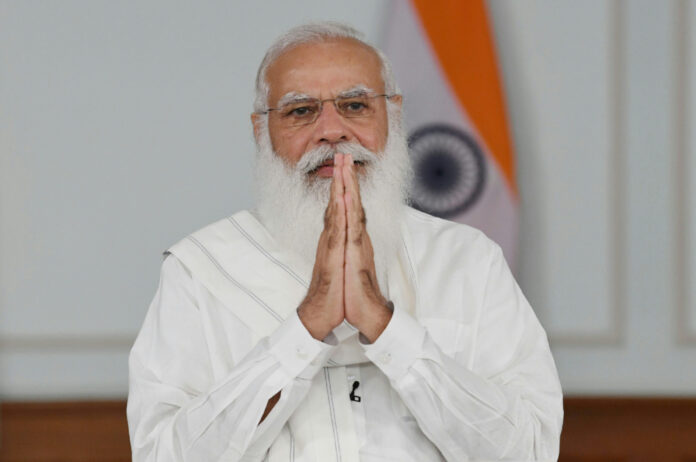Indian Prime Minister Narendra Modi has inaugurated the “grand Ram temple” built at the site of the demolished 16th-century Babri Mosque in the northern Indian city of Ayodhya.
Modi arrived in Ayodhya to participate in the consecration ceremony attended by 8,000 guests, including senior officials, Indian film stars and cricketers.
Amid Hindu religious hymns, Modi led the opening ceremony during which a stone sculpture of “Lord Ram” was unveiled inside the temple’s inner sanctum.
“The Lord has made me an instrument to represent all the people of India during the consecration,” PM Modi said on X as he began 11 days of special rituals ahead of the inauguration.
Describing it as a “historic moment,” Modi emphasised the significance of “Lord Ram” taking his place in the temple. He encouraged Indians to mark the occasion by lighting lamps in their homes and nearby temples on Monday evening, creating a festive atmosphere akin to Diwali.
Officials said tens of thousands of devotees are expected to visit the temple from Tuesday onwards.
Constructed at an approximate cost of $217 million, the temple is spread over 2.7 acres (1.1 hectares). The entire temple is expected to be completed this year.
Subscribe to our newsletter and stay updated on the latest news and updates from around the Muslim world!
“The resolve of centuries is being fulfilled, the hours of waiting have passed, the penance, renunciation and sacrifice of innumerable Ram devotees are being rewarded,” the ruling Bharatiya Janata Party (BJP) wrote on X.
Ahead of the ceremony, many Indian states declared half-day and full-day holidays, with even health institutes at some places shutting patient services for half a day. At many places, live screenings of the religious ceremony have been organised.
In the capital New Delhi – some 428 miles (689 kilometers) from Ayodhya city – saffron-colored flags with images of “Hindu gods” are dotting most of the markets.
The temple opening also marked the ruling Bharatiya Janata Party’s accomplishment of a major policy pledge. General elections are due in India in the next few months and political commentators say it would benefit the ruling party electorally.
“Given the temple issue is on the slow burner for decades in Hindi belt states, BJP will benefit electorally even among sections of Hindus who closely follow other parties/ideologies,” Indian political commentator Niranjan Sahoo told Anadolu Agency.
Hindu-Muslim dispute
Built in 1528 under the rule of the first Mughal Emperor Babur, the grand mosque along with a land of 2.77 acres became the centre of a dispute in the latter half of the 19th century when Hindutva said it was the birthplace of King Rama, who is said to have ruled the region somewhere between 869,108 to 18.14 million years ago. Hindus believe that Rama was the incarnation of God Vaishnava.
The 400-year-old Babri Mosque was razed to the ground on December 6, 1992, by a large group of activists belonging to the Hindu nationalist organizations like Vishwa Hindu Parishad (VHP), affiliated to Rashtriya Swayamsevak Sangh (RSS). They claimed that the mosque stood on the birthplace of Lord Ram.
The aftermath saw widespread riots across the country, in which more than 2,000 people, mostly Muslims, were brutally killed.
The international community and human rights groups vehemently condemned the Babri Mosque’s demolition, viewing it as a blatant violation of India’s secular constitution. But despite assurances from the government to rebuild the mosque and hold perpetrators accountable, it failed on both fronts.

The decades-long dispute between Hindus and Muslims over the ownership of the site was settled by the Indian Supreme Court in 2019 when it handed over the site to Hindus and allowed the construction of a temple.
The court also directed authorities to allow a separate land on the outskirts of Ayodhya to the Sunni Central Waqf Board to build a new mosque.
On court orders, the Uttar Pradesh state government has handed over a five-acre land to the Waqf Board on the outskirts of the city as compensation to build the mosque. The board, which was formed to construct the mosque, says construction will start this year.
Opposition leaders, including those from the Congress party, boycotted the inauguration, seeing it as a political manoeuvre rather than a religious ceremony.
Congress leader Rahul Gandhi criticised the consecration ceremony of the Ayodhya Ram Temple, stating that it has been “captured by the Prime Minister and the RSS.” He accused them of turning it into an “election function” for the BJP’s election campaign.
Gandhi, during a press conference in Nagaland, said he was disinterested in using religion for political gain, asserting that faith is a personal matter. He highlighted that the event on January 22 has become more of a “political Narendra Modi function” rather than a religious one.
Jairam Ramesh, the General Secretary (Communications) of the party said: “Lord Ram is worshipped by millions in our country. Religion is a personal matter. But the RSS / BJP have long made a political project of the temple in Ayodhya.”
Asaduddin Owaisi, the chief of the All India Majlis-e-Ittehadul Muslimeen (AIMIM), asserted that the Babri Masjid in Ayodhya was “very systematically snatched from the Muslims.”
“…the Muslims had offered namaz in that area (Babri Masjid) for 500 years. When Congress’s GB Pant was the chief minister (of Uttar Pradesh), idols were placed inside the masjid at one night… but the idols were not removed from there… there was a collector named Nair. He shut down the Masjid and started doing puja there, and in 1950s, Nair became the Jan Sangh’s first member of the Parliament,” Owaisi said.
Some Hindu leaders also object to the inauguration, arguing that the temple’s incomplete status violates Hindu scriptures and objecting to the involvement of divisive political figures.
SOURCE: AA and 5Pillars





















